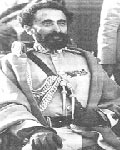This Day in History: September 29, 1935
Additional Date: September 29, 1935
Ethiopia had been one of the few states to survive "the scramble for Africa" by the major European powers in the late 19th century. Both Italy and Ethiopia were members of the League of Nations, founded in 1920. Italy was a founding member and Ethiopia joined 28 September 1923. However, during the run up to the Second World War, Benito Mussolini, Italy's fascist dictator, dreamed carving out a "New Roman Empire" around the Mediterranean sea and northern Africa.
The infamous Walwal incident provided the pretext Mussolini needed. Walwal was an oasis in the Ogaden dessert, along the boarder between Ethiopia and Italian Somaliland. The Italians contrived a boarder dispute and occupied Walwal in 1930. After a boarder clash in 1934, Mussolini claimed that Italy had been wronged and demanded satisfaction. Ethiopia appealed to the League for arbitration. But the League's response was sluggish at best.
It was then when Emperor Haile Selassie, complained to the League of Nations, calling on the League to invoke its doctrine of collective security. An attack on one member of the League was supposed to be regarded as an attack on all members. Indeed, it was this protection that had inspired him to join the League in the first place against the wishes of the hostile nobility who wanted no part of a "foreigners" League. Still, like many after the bloodletting of The Great War, Selassie put his faith in the League to stop future wars.
What was not foreseen however, was Hitler's rapid rise to power in Germany. By this time, Britain and France had still hoped to contain Hitler. It was thought that Mussolini's Italy could still serve as a bulwark against German ambitions in Austria, and thus did not want alienate Mussolini over what they considered an unimportant African state. French and British attempts to ease the dispute were often made at the expense of Ethiopian interests.
On 29 September 1935, Emperor Selassie announced that he had no choice but to mobilize Ethiopia's large, but poorly equipped army. Mussolini launched a full scale invasion on 3 October. The League responded by condemning the invasion and imposing economic sanctions on Italy. However the sanctions we not only weak, but were not taken seriously by all members, especially France and the United Kingdom. The weakness of the League thus exposed, Ethiopia was left alone. The invasion is regarded as one of the most one-sided and brutal of the 20th century. By early May Emperor Selassie evacuated the capital city of Addis Ababa. On May 7th, Italy officially annexed Ethiopia.
Haile Selassie addressed the League on 20 June 1936, the same time that the League officially condemned the Italian invasion and annexation. During his address he asked, "What answer shall I take back to my people?" warning further that, "It is us today, it will be you tomorrow." The Emperor was toasted and hailed around the world by anti-fascists, and Time magazine named him "Man of the Year". Today his prophetic words to the League of Nations are often cited as a foreshadowing the Second World War to the ill-prepared nations of the world.
